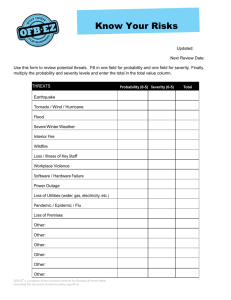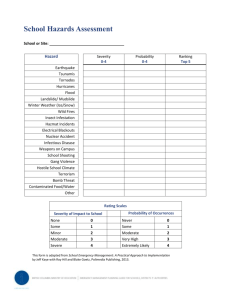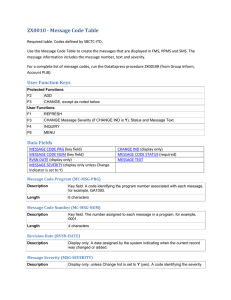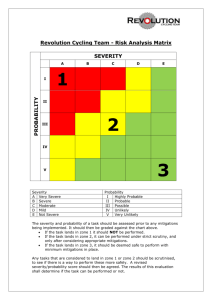Document 11286888
advertisement
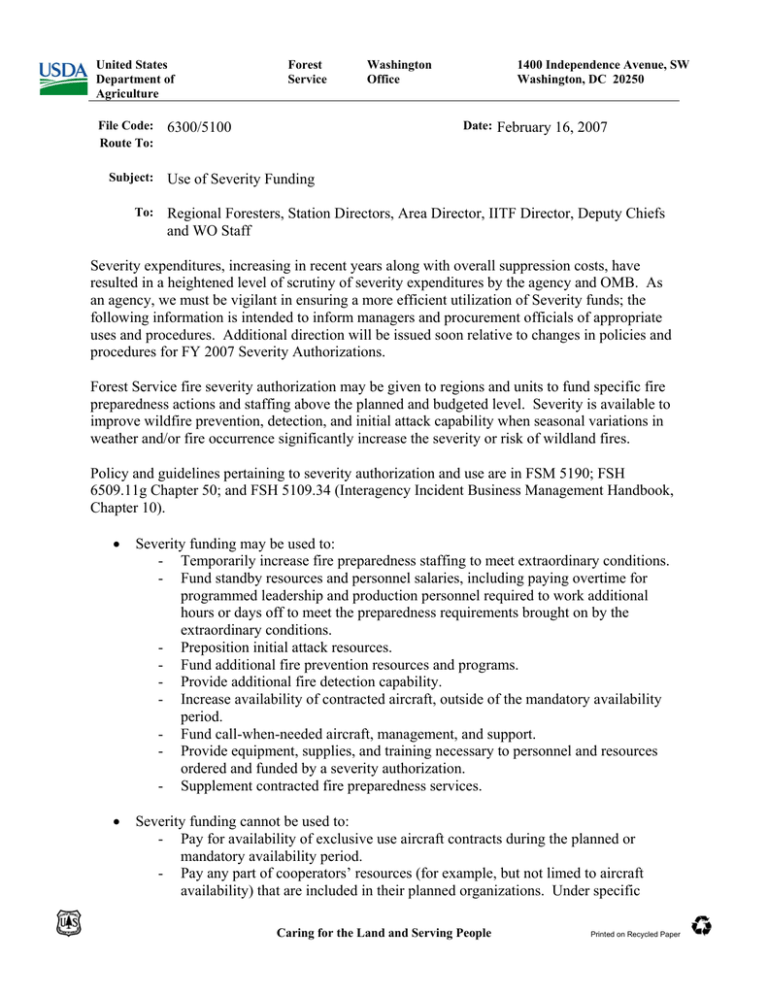
United States Department of Agriculture File Code: Route To: Subject: To: Forest Service Washington Office 1400 Independence Avenue, SW Washington, DC 20250 Date: February 16, 2007 6300/5100 Use of Severity Funding Regional Foresters, Station Directors, Area Director, IITF Director, Deputy Chiefs and WO Staff Severity expenditures, increasing in recent years along with overall suppression costs, have resulted in a heightened level of scrutiny of severity expenditures by the agency and OMB. As an agency, we must be vigilant in ensuring a more efficient utilization of Severity funds; the following information is intended to inform managers and procurement officials of appropriate uses and procedures. Additional direction will be issued soon relative to changes in policies and procedures for FY 2007 Severity Authorizations. Forest Service fire severity authorization may be given to regions and units to fund specific fire preparedness actions and staffing above the planned and budgeted level. Severity is available to improve wildfire prevention, detection, and initial attack capability when seasonal variations in weather and/or fire occurrence significantly increase the severity or risk of wildland fires. Policy and guidelines pertaining to severity authorization and use are in FSM 5190; FSH 6509.11g Chapter 50; and FSH 5109.34 (Interagency Incident Business Management Handbook, Chapter 10). • Severity funding may be used to: - Temporarily increase fire preparedness staffing to meet extraordinary conditions. - Fund standby resources and personnel salaries, including paying overtime for programmed leadership and production personnel required to work additional hours or days off to meet the preparedness requirements brought on by the extraordinary conditions. - Preposition initial attack resources. - Fund additional fire prevention resources and programs. - Provide additional fire detection capability. - Increase availability of contracted aircraft, outside of the mandatory availability period. - Fund call-when-needed aircraft, management, and support. - Provide equipment, supplies, and training necessary to personnel and resources ordered and funded by a severity authorization. - Supplement contracted fire preparedness services. • Severity funding cannot be used to: - Pay for availability of exclusive use aircraft contracts during the planned or mandatory availability period. - Pay any part of cooperators’ resources (for example, but not limed to aircraft availability) that are included in their planned organizations. Under specific Caring for the Land and Serving People Printed on Recycled Paper Regional Foresters, Station Directors, Area Director, IITF Director, Deputy Chiefs and WO Staff - • • • 2. provision in the annual operating plan for a cooperative agreement, Forest Service approved severity funds may be used in contribution with cooperator funds for additional, unplanned resources to meet severity conditions. Pay for any non-fire preparedness activity, such as the salaries of employees who may hold fire qualifications, but are otherwise performing their normal duties. Buy equipment or supplies, finance training, fund vehicle FOR or maintenance, or finance contracts that are part of the planned preparedness organization. Pay for administrative surcharges, indirect costs of fire program support, fringe benefits or awards for employees. Pay for fire suppression activities in lieu of an appropriate incident fund code. Funding of additional resources acquired under severity authorization should be curtailed when the extraordinary circumstances that justified the severity request no longer exist, even if the changed conditions occur during the period in which the severity authorization is made. Severity funded work is treated the same as a fire for purposes of compensable travel and overtime. Lodging and meals may be procured with purchase cards for severity funded resources when individual travel cards or another procurement instrument is not available. (For example: If a crew boss is traveling with a group of casual employees, he/she must use the individual travel card for his/her lodging and meals, but may use the purchase card for the crew’s lodging and meals.) This is a change from the current policy at FSH 6309.32,4G13.301-71. Using Severity Authorization to Fund Equipment Provided by Emergency Equipment Rental Agreements (EERA): In the past, due to the direct signup nature of Emergency Equipment Rental Agreements (EERAs) and lack of competition, EERAs were not an appropriate tool for hiring resources using severity funding. Forest Service policy provides for competitively soliciting preseason EERA equipment by FY 2010. In advance of full implementation of this plan and acknowledging that units are already awarding EERAs through competition, any equipment awarded on an EERA where competitive procedures were used may be used during a severity authorization. Work performed on a severity resource order is paid at 75 percent of the suppression rate and should be stipulated in the award document. Appropriate severity activities are: stand-by, patrol, tool sharpening, or other activities that do not unduly interfere with fire readiness and a 10-minute mobilization response time. Once resources are mobilized to an incident, they will be compensated at the emergency suppression rate. Regional Foresters, Station Directors, Area Director, IITF Director, Deputy Chiefs and WO Staff 3. For consistency, units are reminded of the following: Severity assignments often are not associated with a formal camp or have meals and lodging provided. If a base camp is not established, remain overnight allowance (RON) may be authorized and is at the Government’s discretion. If the resource is allowed to return to its dispatch location during off-shift time, RON allowance is not authorized. When the Government cannot provide a campsite or meals, actual lodging expenses incurred by contractors providing services under an EERA (whether for severity or incident responses) are reimbursable, if authorized by the user unit and properly receipted and invoiced. The maximum allowable rates, excluding taxes, are referenced in the Continental United States (CONUS) rates in the Federal Travel Regulations (FTR). Double occupancy of hotel rooms may be required. Any associated lodging taxes are reimbursable as documented on the lodging invoice. Reimbursement for food and drink would be based on maximum CONUS per diem rates minus MI&E and any Government-provided meals. The Overnight Allowance for food and lodging is not authorized while in travel status as referenced in Clause 8 of the General Clauses to Emergency Equipment Rental Agreement Form OF-294. Contractors are required to provide sufficient food and drink to the crew while in travel status and the first shift of the incident. This is not reimbursed by the Government. These policies do not supersede direction as stated in an advertised solicitation and resultant contract. /s/ T.C. Harbour TOM HARBOUR Director, Fire and Aviation Management cc: Bill Breedlove Karyn L Wood Mary A Szymoniak Cheryl Emch Laurie Lewandowski Jeffrey G Park Ronald Wester /s/ Ronald E. Hooper RONALD E. HOOPER Director, Acquisition Management
